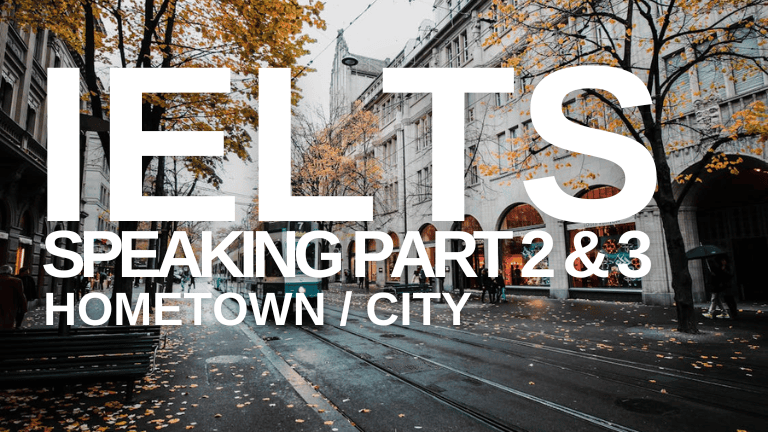
IELTS Speaking Part 2 & 3 – Hometown / City
IELTS Speaking Part 2
Describe a place in your hometown/city that is different from other places and that you enjoy visiting with your parents/friends
You should say:
- Where it is
- What it is like
- What you often do there
- Who you often go there with
- And explain why you think it is different
I would like to talk about a unique place in my hometown, Eugene, called the Saturday Market’s Holiday Market. It’s a special event that happens during the holiday season, and it’s completely different from any other place in the city.
The Holiday Market is located indoors at the Lane Events Center, which is transformed into a vibrant space full of color and energy. It’s a wonderful mix of art, crafts, music, and food. The atmosphere is warm and festive, with local vendors selling handmade products like jewelry, pottery, and clothing. You’ll also find delicious food stalls offering a variety of cuisines, and there’s always live music to entertain visitors.
I often go there with my parents or friends during the holiday season. We like to explore the different stalls and admire the creativity of the local artists. Sometimes we buy unique gifts for family and friends, as the market is the perfect place to find one-of-a-kind items. We also enjoy trying out the food there, from fresh baked goods to international dishes. The live music adds to the experience, making it feel like a community celebration rather than just a shopping trip.
What makes the Holiday Market different is its focus on supporting local artists and creating a sense of community. Unlike regular malls or shopping centers, this market has a personal and artistic touch. Every item you see has a story behind it, and you can often chat with the artists who created them. The whole place feels alive with creativity and holiday spirit, which is something you don’t find in other parts of the city.
I enjoy visiting the Holiday Market because it’s not just about shopping—it’s about celebrating the local culture, spending time with loved ones, and enjoying the festive atmosphere. It’s a place that truly brings people together.
IELTS Speaking Part 3
- What factors attract people to go to visit other places other than their hometown?
- Do you think it is necessary to visit the same place many times?
- What do young people like to do in their leisure time?
- What are the differences between the places young people like to go and the places old people like to go?
- Where do people in your hometown like to go?
- What are the differences between big cities and small cities?
1. What factors attract people to visit other places other than their hometown?
Several factors attract people to visit places outside their hometown. Personal interest is a major driver, as people often seek new experiences, explore different cultures, or visit famous landmarks that are not available in their hometown. Incentives and motivation also play a key role, such as the desire to relax, take a vacation, or engage in specific activities like sightseeing, shopping, or adventure sports. However, I believe there must be something in return for the visit, whether it’s personal growth, fun, or unique experiences. For instance, while I wouldn’t visit another person’s hometown unless there’s a compelling reason, when I travel, I expect to gain something, whether it’s new experiences or valuable memories.
2. Do you think it is necessary to visit the same place many times?
There is no reason why one cannot visit the same place multiple times. In fact, returning to a place can offer new experiences, as people may notice things they missed on previous visits or gain a deeper understanding of the location. For instance, a city might reveal different facets during different seasons, or personal interests might evolve, offering fresh perspectives. Repeated visits can also allow for relaxation, as familiarity with a place makes it easier to enjoy. Whether it’s a favorite holiday destination, a park, or a historical site, visiting the same place multiple times can deepen one’s appreciation for it and provide a sense of comfort and connection.
3. What do young people like to do in their leisure time?
In their leisure time, young people often engage in a variety of activities depending on their interests and available resources. Many enjoy socializing with friends, using social media, or gaming. Some might prefer more active pursuits like sports, going to the gym, or hiking, while others may enjoy creative hobbies such as music, painting, or photography. Entertainment through movies, television, or online content is also common. Leisure activities may be spontaneous, offering a way to pass time and unwind from daily routines. It’s important to note that the preferences of young people can vary widely, as they often explore new activities or trends based on what is popular or personally enjoyable.
4. What are the differences between the places young people like to go and the places old people like to go?
The places young people and older people like to visit often differ based on lifestyle preferences and physical abilities. Young people are more likely to seek out places with excitement, entertainment, and social interaction, such as busy cities, shopping malls, or popular tourist attractions. They may also enjoy nature-based activities like hiking or visiting theme parks. In contrast, older people might prefer quieter, more relaxed locations such as parks, museums, or gardens. They may value comfort and ease, choosing places that are not too physically demanding and where they can enjoy peaceful environments. However, these preferences vary by individual, and some older people may enjoy active or social outings as well.
5. Where do people in your hometown like to go?
In my hometown, people tend to enjoy spending time outdoors, particularly in parks and nature reserves. These spaces offer a peaceful environment for various activities such as walking, jogging, fishing, or simply relaxing in nature. There are also recreational areas for families to gather, have picnics, or engage in sports. People in my hometown often value nature and the opportunity to disconnect from the hustle and bustle of daily life. Additionally, local events and community gatherings are common, and some people may visit local markets or cafes to enjoy the social atmosphere. Overall, outdoor activities seem to be a favored choice for most in my hometown.
6. What are the differences between big cities and small cities?
Big cities and small cities differ in several ways, but one of the most notable differences is the stress level. Large cities, like New York or London, are often fast-paced, crowded, and highly stimulating. The sheer volume of people, noise, and traffic can create a hectic environment that some may find overwhelming. On the other hand, smaller cities tend to offer a slower, more relaxed pace of life. There’s less noise and congestion, making it easier to enjoy daily activities without the constant rush. Small cities allow for a greater sense of community, and the lifestyle can be more peaceful and centered around local connections. However, large cities often provide more job opportunities, entertainment options, and cultural experiences.
Check Educatorian, IELTS Rizz IELTS WE and IELTS101
Check List of question for September to December 2024

Ian Tanpiuco is an ESL and virtual assistant. With a decade of experience, he has become an expert in his field. Dedicated to helping others achieve their goals, Ian works tirelessly in the classroom or as a virtual assistant.

